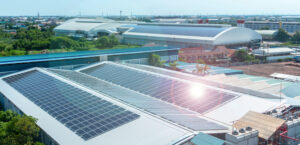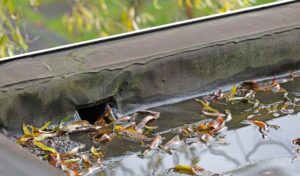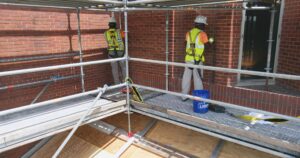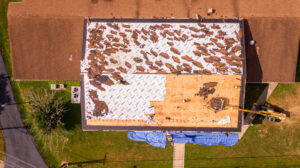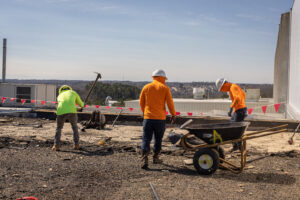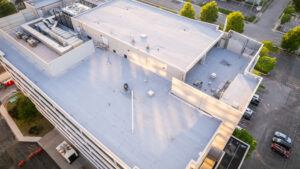When designing a roofing system, it’s important to choose the right material for the job. Not all materials are created equal, and each has different advantages and disadvantages.
A few factors will affect what material you decide to use on your low-slope roof.
Temperature — Because low slope roofs drain sower, pooled water can freeze in frigid temperatures. When hot and direct exposure to sunlight, pooled water can grow moss and algae, adding weight to your roof frame. When selecting your material, be sure to think through the potential extreme temperatures your roof will have to withstand.
Slope— Materials work within a specified slope range, which the manufacturer in their technical materials should specify. Make sure your roof’s slope is within the specified slope range of the materials you’re considering.
Warranty — Manufacturers will include in their warranty a requirement for slope range. Be diligent about reading through warranties, and make sure you’re not installing something outside of what the manufacturer will cover.
Once you’ve factored in temperature, slope, and warranty, you’re ready to select your material. Here are some of the most common roofing materials and their distinct advantages and disadvantages.
Single-Ply Membranes for Low Slope Roofing
The most common single-ply membranes are EPDM, TPO, and PVC. These materials have come to dominate the low-slope roofing market due to their ease of installation, low materials cost, and durable performance.
1. TPO
Thermoplastic polyolefin (TPO) is a single-ply membrane that comes with a host of benefits. Often manufactured in white or a lighter color, TPO reflects UV well and can contribute to your building’s energy efficiency.
Like other single-ply materials, TPO can be prefabricated into large sheets. It can be installed using mechanical fasteners or adhesive seam tape. It’s durable, able to withstand weather, and resists expansion/contraction well. All of these features combine to make TPO one of the most popular materials on the market.
2. PVC
Polyvinyl Chloride (PVC), like TPO, can be prefabricated into large sheets to make installation quicker. PVC’s main advantage is its chemical resistance – making it an excellent choice for restaurants with kitchen exhaust or manufacturing facilities.
3. EPDM
TPO and PVC or thermoplastic membranes, while Ethylene Propylene Diene Terpolymer (EPDM) is a thermoset — it’s rubber. One advantage of EPDM is that it can be manufactured in 50 foot wide sheets. It’s easy to install with a tape and primer adhesive system. Its flexibility makes it a great choice for low-slope roofs as it handles building movement and settling exceptionally well.
It’s also more chemically resistant than TPO but can be susceptible to minor tears from rocks stuck in shoes. It may be best to avoid EPDM where a lot of foot traffic is expected.
If you’re considering EPDM roofing for your low slope roof, learn about the Advantages and Disadvantages of EPDM Roofing.
Built-Up Roofing
Built-up roofing (BUR) systems have been used for over a century and have proven to be the most durable of all low-slope roofing materials. It’s installed using a combination of asphalt and gravel, making the installation process much more labor-intensive than single-ply materials.
The durability and longevity of BUR systems make them an attractive choice for low-slope roofs.
Modified Bitumen
Modified Bitumen is closely related to BUR systems and was introduced to the United States in the 1970s. It’s a multi-layer system that requires a more labor-intensive installation than single-ply systems. But, like built-up roofing, it’s durable and withstands hail and extreme weather conditions.
Modified bitumen is often cited as having issues with pooling water, leading to vegetation growth or eventual damage to the membrane. However, a properly designed and installed system can ensure water is effectively drained and managed on modified bitumen roofing systems.
Get the Best Commercial Roofing Material for Your Building
Have a low slope roofing project in Morristown, Hendersonville, Nashville, or Knoxville, TN? Eskola roofing has experience installing all types of low slope roofing materials. Based on the type of building and business you run, we’ll suggest you the best commercial roofing material. Contact us to learn more about our services and how we can help.

